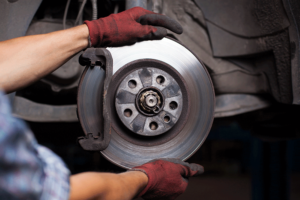
It is one of those routine maintenance tasks you cannot ignore. Brake parts need to be regularly serviced and sometimes replaced to work properly. Your vehicle will usually give some clear signs that your brakes are in need of some repair. Since the brakes are one of the most important safety components in your vehicle, you will need to fix them as soon as possible.
Light indicators
When one of the red or yellow brake indicators on your dashboard lights up it may mean you are just due for an inspection. It could also be your vehicle’s smart electronics alerting you to a problem. A parking brake on could also cause the light to go on. Be sure it is fully released to confirm that’s not the issue. If you start hearing a high-pitched noise that stops when you apply the brakes, it is likely the sound of the brake pad wear indicators. They’re made of steel so they make this sound when they start contacting the rotor. When this happens, they are alerting you that the brake pads have worn out and need to be replaced before damage is done to the rotor.
Grinding feeling
Grinding that you also feel in the pedal could mean a number of things. There could just be some gravel or a rock caught in the caliper unit, which can be easily fixed. If you have gone longer without a brake inspection, the brake pads may be worn through, and you are hearing metal on metal that could be creating grooves in the brake rotor. Grinding could also be an indicator of lack of lubrication in vehicles with rear drum brakes.
Poor steering wheel
Shaking in the steering wheel or vibration when you apply the brakes may be the result of an uneven rotor. Brake rotors are big discs that sit inside of the wheels. When you hit the brake pedal, the brake pads hug the rotors, slowing them and your vehicle. You want rotors to be smooth and completely even in thickness. Over time and thousands of wheel revolutions, it is normal for the rotor surface to get slight variations. Rust can also sometimes develop.
If you’re experiencing a soft brake pedal, look for fluid leaking from the master cylinder or elsewhere in the brake system. The master cylinder is the unit that creates the power for your brakes. It has a reservoir like the one for your wiper fluid that contains brake fluid. When you apply the brakes, this fluid is pushed through thin piping, creating hydraulic pressure. If fluid is leaking, there may not be enough power to force the brake pads to clamp hard to the rotors. No matter what issue you notice, make sure to bring the vehicle in so we can inspect it for you.
Recent Comments